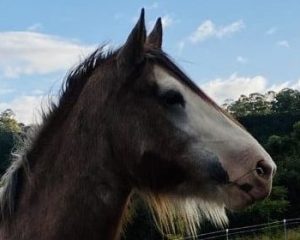Surprising Parasites
March 17, 2021
Equine veterinary hospital Comments Off on Standing tieback surgery for ‘roarers’
22
15
18
Say Hello to Maisie!
Maisie is a beautiful 6- year old Clydesdale mare who was recently purchased as a riding companion, she was broken in for riding at a reasonably mature age. Prior to this, she spent several years as a broodmare, co-living with a herd of mares and foals.
Maisie’s new owner has always included Faecal Egg Counts (FEC) as a part of her horse health management and participated in Camden Equine Centre’s parasite control month. When the results came back, we were shocked It wasn’t the high count of 500 eggs per gram of Strongyles which was alarming but, the presence of Parascaris equorum commonly known as Ascarids.
Ascarids are normally found in younger horses up to 2 years of age (typically weanling age to 1-year-olds). Rarely seen in older animals, it is suspected that their immunity develops as a horse matures. In large amounts, they can cause ill thrift, stunted growth, and a potbelly appearance. If the worm numbers are sufficiently high, they can cause obstruction of the small intestine and lead to signs of abdominal pain (colic). In severe cases, the obstruction can rupture and cause death. Obstruction of small intestines with ascarids can sometimes require surgical intervention if the abdominal pain is not able to be controlled with medication.
It is thought that Maisie’s exposure to younger horses sharing a pasture as a broodmare has most likely contributed to the high number (5500 eggs per gram) in her sample. Luckily for Masie Camden Equine Centre was able to tailor a worming program that included a 6-day course of Fenbendazole followed by Moxidectin to combat the Strongyles.




0 Comments